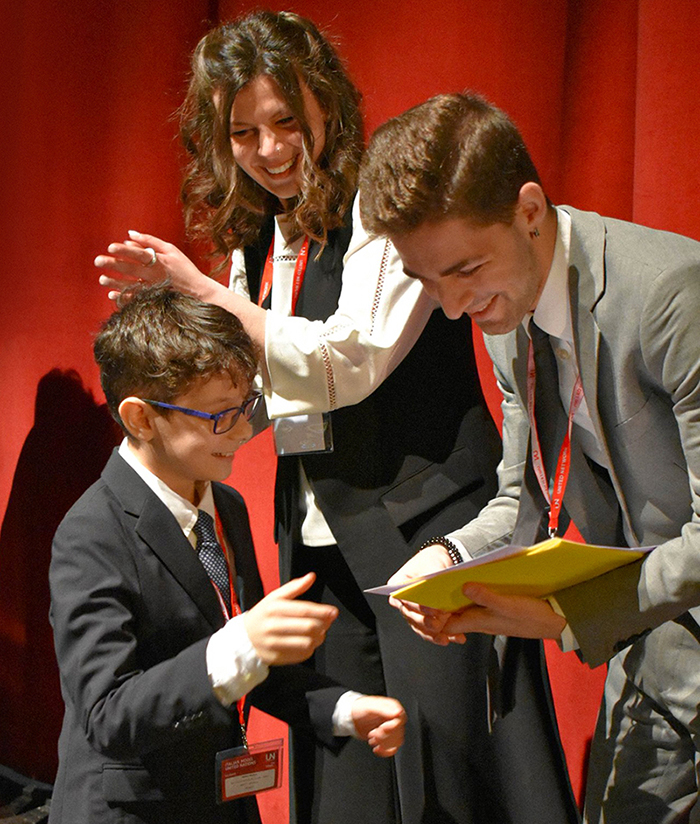IMUN Middle School
Italian Model United Nations is a great role-playing game in which students from all schools in Italy participate. Students simulate being ambassadors to the United Nations, a sort of great world parliament in which all states are represented. During the simulation you will learn to use the tricks that real diplomats use to forge alliances, find shared solutions to the most delicate world issues, and you will understand, while having fun, how a real international organization works.

How it takes place
IMUN Middle
School?
Delegates begin working within the Committee they are assigned to, each representing a UN member country. You could be Germany, Burkina Faso, Portugal, or the United States of America. Our staff will help you to take part in the simulation and give your speech in English, to understand how to make your ideas prevail “in a diplomatic way” and to discover all the secrets of the United Nations Organization. At the end of the simulation, you and your new friends will approve resolutions, and if you did well, you can win an honourable mention.
DISCOVER 2026 EDITIONS
The Training
To better face IMUN Middle School, in the previous months, you will participate in the Delegate Training Course, created specifically to allow you to participate in the simulation while having fun and helping you to overcome any fear: our Staff will help you understand how the UN General Assembly works and how much fun it can be to know and apply all the rules of the “game”. The lessons you will follow will be engaging and interactive. The entire course, as well as the simulation, will be conducted in English. But don’t worry, to participate you don’t need a perfect knowledge of the language, but only a desire to have fun and meet new friends.
IMUN - FAQ
The answers you seek
All students enrolled in Italian middle schools can take part in IMUN Middle School. No English language certificates are required to participate in the simulation and there is no requirement to pass an aptitude test. All students who want to test themselves and improve their English level can take part. Students can register by the date indicated during the orientation meeting held at the school.
You can enroll by clicking on this link. Instructions for completing the registration will be sent to the student’s contact email following registration. Registration will be considered valid only after the balance of the participation fee has been paid. Student participation in the simulation is limited in number. Students who do not complete the registration in the required time will be placed on a waiting list.
The costs of participation in IMUN Middle School are indicated in the information material distributed at the schools. You can request more information by sending an e-mail to info@unitednetwork.it or calling our office. The participation fee includes: participation in the Delegate Training Course; participation in IMUN Middle School; educational materials; certificate of attendance and participation.
Each year United Network provides more than €100,000 in scholarships to support lower income earners. To apply for a scholarship, sign up for the project and follow the instructions provided in your reserved area. Final membership may be made contingent upon the award of a scholarship.
The Italian Model United Nations project is conducted in English.
IMUN - FAQ
All students enrolled in Italian middle schools can take part in IMUN Middle School. No English language certificates are required to participate in the simulation and there is no requirement to pass an aptitude test. All students who want to test themselves and improve their English level can take part. Students can register by the date indicated during the orientation meeting held at the school.
You can enroll by clicking on this link. Instructions for completing the registration will be sent to the student’s contact email following registration. Registration will be considered valid only after the balance of the participation fee has been paid. Student participation in the simulation is limited in number. Students who do not complete the registration in the required time will be placed on a waiting list.
The costs of participation in IMUN Middle School are indicated in the information material distributed at the schools. You can request more information by sending an e-mail to info@unitednetwork.it or calling our office. The participation fee includes: participation in the Delegate Training Course; participation in IMUN Middle School; educational materials; certificate of attendance and participation.
Each year United Network provides more than €100,000 in scholarships to support lower income earners. To apply for a scholarship, sign up for the project and follow the instructions provided in your reserved area. Final membership may be made contingent upon the award of a scholarship.
The SNAP IUNIOR project is conducted in Italian.